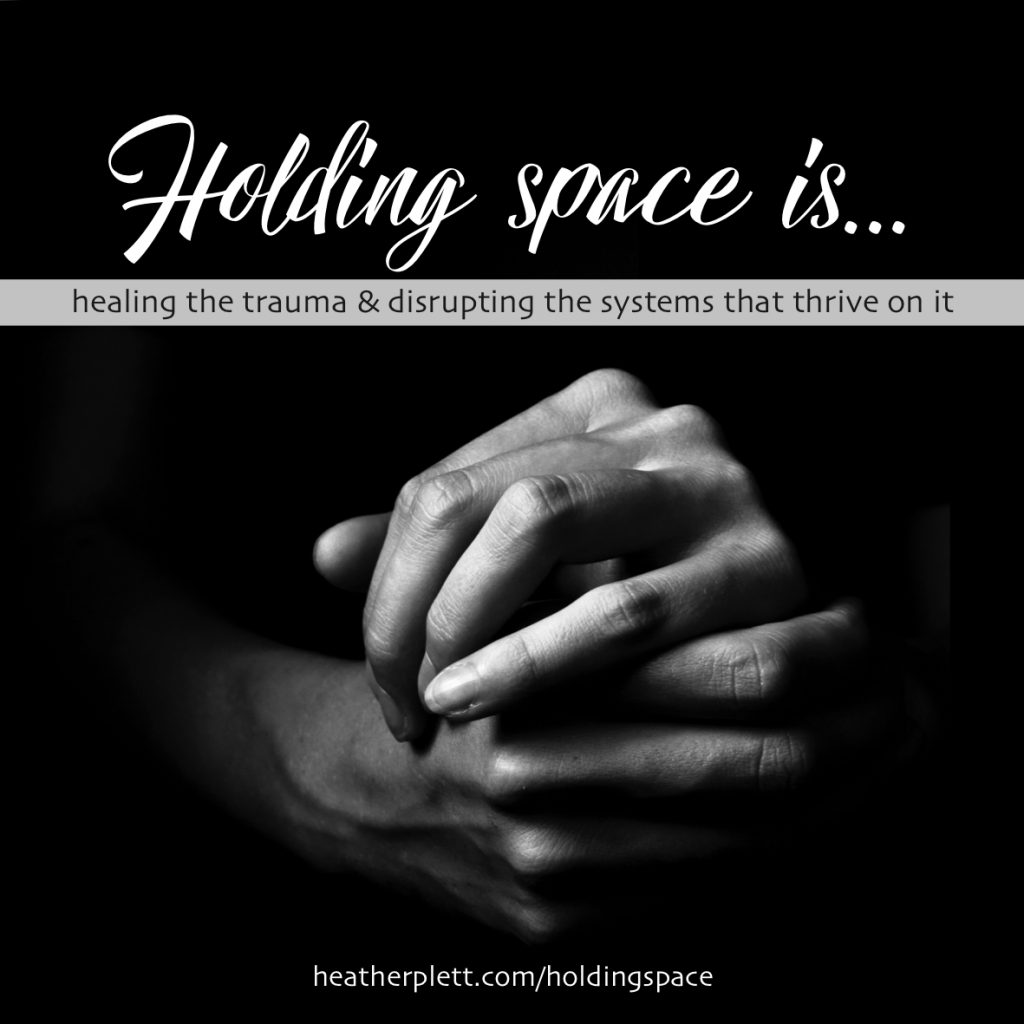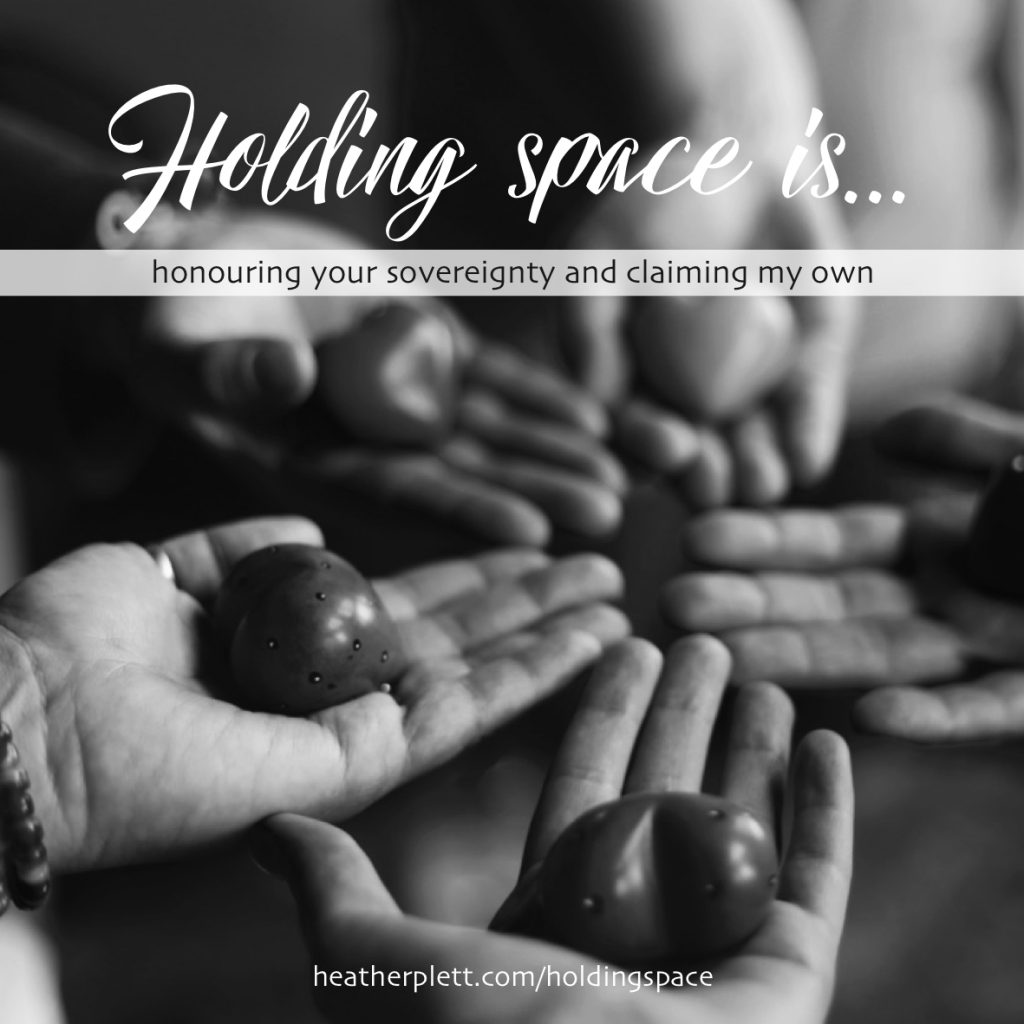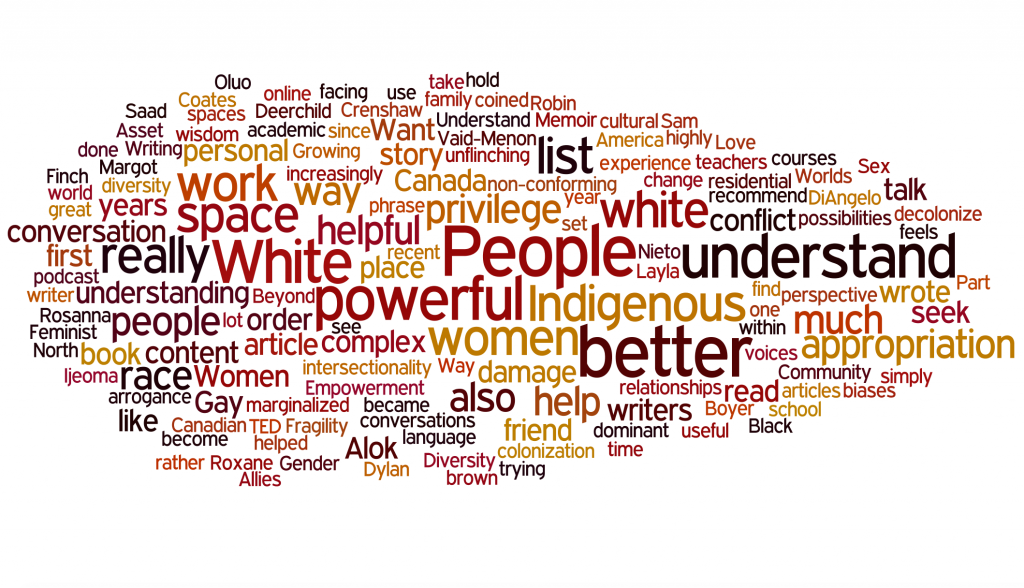by Heather Plett | May 1, 2018 | Uncategorized

Sometimes you don’t know that you know something until you hear the words come out of your mouth. That’s how it was when I said these words a few weeks ago, while teaching my Holding Space Coach/Facilitator Program…
“Trauma is the soil in which the patriarchy has grown.”
I’ve thought a lot about trauma and I’ve thought a lot about patriarchy, and I’ve even thought about the links between them, but I hadn’t articulated this thought before. Even as I said it, I realized I was speaking something new into my awareness.
Now that I’ve thought about it more, I realize it’s a bit of a “chicken and egg” situation. Which came first – the trauma or the patriarchy? The patriarchy may also be the soil in which trauma has grown. One nourishes the other, which in turn nourishes the other, and so on, and so on. Did trauma happen to a group of people and so they rose up and began to dominate and create systems of domination to protect themselves? Or did people begin to dominate out of their own selfish ambition and need for power and soon learned that it was easier to dominate traumatized people? I don’t have a sufficient lens on history to analyze this.
Also, you can interchange the word “patriarchy” with any system of dominance (white supremacy, colonization, oppression, heteronormativity, kyriarchy, etc.) and the statement remains applicable. Trauma informs and supports them all.
Consider all of the ways that trauma is used as a tool to help dominant systems uphold their dominance. Indigenous children were ripped out of their families and forced into residential schools where they were stripped of their language and rituals. African people were rounded up, forced onto ships, and brutally enslaved in North and South America. Women are routinely raped in conflict situations. Jewish families were thrust into concentration camps and many were killed in gas chambers.
(Side note: I highly recommend the movie Indian Horse for a gripping story about how the trauma of colonization controls and destroys people.)
The stories go on and on throughout history, and these are just the most notable and horrific. There are so many more subtle ways that trauma is used as well. The #metoo movement, for example, is revealing the many ways in which sexual assault has been used to dominate women in the workforce, in the media, and at home.
None of these stories are “once and done” situations either. Every one of them not only traumatizes the generation most directly impacted, it plants the seeds of trauma into the family systems. The generations to come inherit the trauma of their parents and their grandparents, and so on, and so on. The result is often the kind of dysfunction, disempowerment and addiction that makes it difficult for them to rise up and challenge their oppressors. Trauma is so deeply (and invisibly) rooted in our bodies, that it can take generations to heal it, especially where it has not been named and faced.
Once you have implanted the seeds of trauma into a family system, it becomes easier and easier to dominate the people in that system. Traumatized people no longer need the original, horrific event to make them shrink in fear. All you have to do is offer a subtle reminder of the trauma, and they are triggered into their fight, flight or freeze reactivity (also known as “amygdala hijacking”), and in that state, they are easier to control and/or manipulate. An abused child, for example, will continue to flinch at a raised hand or raised voice long after the abuse is over and will continue to go to great measure to find protection against what they see as a dangerous world.
Sometimes it seems that we now have so much trauma running through our systems that there are fewer people WITHOUT trauma than WITH trauma (either direct or generationally inherited). It seems we’re all the walking wounded, trying to function in a world that triggers us on every front.
If you want to understand how trauma is used as a tool of domination, consider the treatment that Black people (particularly in the U.S., but also in Canada) have received from the police. Unlike white people, they can never assume that they are safe in the presence of the police, because they have seen too many people like them killed and/or unfairly arrested or brutalized by the police. In a traumatized system like that, you only have to bring a police officer into the environment to cause a state of panic in many people. That’s a system of dominance which not only traumatizes people, but gives those in power an excuse to continue to dominate. They assume that their experience of traumatized Black people (who might respond with belligerence, anger, resistance, etc., as a result of their fight/flight/freeze activation) is universal and even when Black people are calm and cooperative (as was the case in Starbucks recently), they assume the worst and arrest them needlessly. Dominance continues.
But trauma doesn’t only impact those being dominated. When there’s trauma in a system, in impacts people at all levels of it. I think it’s interesting to note, in fact, that it’s often the people with seemingly the most power in a system who are the most reactionary when they’re triggered. Why, for example, if women have less power than men, is it usually men who commit acts of violence? I suspect it’s partly because they’ve had less reason to develop coping strategies and less encouragement to heal and name the trauma. (I was at a workshop recently, where men were doing some healing work and, in one particularly poignant moment, three men were at the centre of the circle weeping and holding each other. It was one of the most powerful and rare moments of healing I’ve ever witnessed and I wish that more men could find themselves there.)
A new concept came into my awareness lately – that of allostatic load. (Thanks Sam.) According to Wikipedia, “it’s ‘the wear and tear on the body’ that accumulates as an individual is exposed to repeated or chronic stress. It represents the physiological consequences of chronic exposure to fluctuating or heightened neural or neuroendocrine response that results from repeated or chronic stress.” Here’s a simple Youtube video that explains it. And Roxanne Gay wrote about it recently in her New York Times column.
While anyone can suffer from allostatic load, I think it’s fair to assume that those who’d be most susceptible to it are those who’ve been most oppressed by systems of dominance. According to Wikipedia, “in environments of chronic or frequent activation of the stress response, such as exposure to violence or trauma, poverty, war, hypoxia, or low rank in a social hierarchy, the stress response constantly disrupts homeostasis resulting in overexertion of physiological systems.” When allostatic load is a factor, people’s bodies can shut down and their brains have less capacity for complex thought and solution-finding. That puts them at a serious disadvantage and makes them easier to dominate.
So… what should we do about this? Should we work at healing the trauma or work at dismantling the systems that created and utilize it? Again, it’s a chicken and egg situation. One informs the other and neither can be entirely isolated from the other. You can’t dismantle a system when all of the people involved in its dismantling have unaddressed trauma. And if you heal trauma without addressing the source of the trauma, you’ve only found a short-term solution – the trauma will rear its head somewhere else.
We need lots of healers and lots of dismantlers. We need people to deepen their understanding of trauma so that they can hold space for it without further contributing to it. We also need warriors who will challenge the systems so that the dominance stops.
As I said in my last article, we should all be in a quest for our own sovereignty, so that we can meet each other as whole and healthy people rather than damaged people who harm each other. But it’s nearly impossible to seek sovereignty when you haven’t worked first to heal trauma that took your sovereignty away. That is, after all, what’s happening when the dominant systems utilize trauma to keep people disempowered – they’re colonizing people and taking their sovereignty away. Because sovereign people are dangerous to those who want to dominate them.
But this is not the end of the story. All of us have the right to reclaim our sovereignty. All of us have the right to live free of trauma and domination.
If you are a traumatized individual, start with your own healing so that you don’t pass the trauma on to others. But don’t stop there. Look for ways of healing at a collective, systemic level. This is something I’m learning more and more about as I dive into healing methodology like family systems constellations (which I had the pleasure of studying with Francesca Mason Boring recently). If we don’t address the trauma rooted in our ancestral lineage and family systems, we fall short of what we need to do to change the future.
If we heal our traumatized systems (and ourselves) and claim our sovereignty, I believe we can become healthy and whole together.
p.s. This is a subject we cover in the Holding Space Coach/Facilitator Program. Registration is now open for the session that starts in July.
by Heather Plett | Apr 3, 2018 | holding space

Up until a dozen years ago, I’d only encountered the word “sovereign” in reference to God and I assumed it had something to do with being all-powerful, all-knowing, in control, and holy. I later encountered it in relation to nations, but, because I’d been raised with a highly tuned blasphemy-detector, I wondered whether that meant those nations were trying to be as powerful as God and whether governments had become “false idols”.
A dozen years ago, I came across the word again when I worked in international development and my colleagues were talking about “food sovereignty”. That’s when I became curious about what I’d missed in my earlier understanding of the word.
There are three categories often used for food-related support: food aid, food security, and food sovereignty. If you give a man a fish (food aid), he’ll eat for a day. If you teach a man to fish (food security), he’ll have food for a lifetime. But what if you put a fence around the pond and only allow him to fish on certain days and he has to go hungry in between? Ensuring he has agency over his food choices and accessibility to the sources of that food is food sovereignty. (In the non-profit world, we supported food sovereignty by funding projects where people were advocating for their right to adequate food and agricultural resources.)
According to Wikipedia, sovereignty is “the full right and power of a governing body over itself, without any interference from outside sources or bodies”. With full sovereignty, the man can fish at the pond when/if he wants, make decisions about that pond, and choose whether or not to share the pond with his neighbours.
Largely, the term is associated with nations and their governments, but what if we bring that definition down to land in our own lives? How does it change your relationship with yourself and with others if you consider yourself to be sovereign and you consider those you’re in relationship with to also be sovereign?
To claim sovereignty means that I get to decide what happens to my body, heart, and mind. It means that I have agency and autonomy and am not controlled or manipulated by anyone. I get to make my own decisions and live with the consequences. I get to choose who I am in relationship with and how much space to give them in my life. I can choose to end relationships that cause me harm and walk away from situations and communities that don’t honour my sovereignty.
If I treat you as someone who has your own sovereignty, it means that I assume you have the same right to self-govern your life as I do. You get to tell me how you want to be treated and I can choose to accept those boundaries or walk away. It’s what I teach in my work around holding space – that we offer love to each other without attachment, manipulation, control, or boundary-crossing.
For me, and I suspect for many others, it feels quite foreign to think of myself as sovereign. I’ve got all kinds of old scripts running in my head telling me that it’s selfish to claim the “full right and power” of my own “governing body” without “any interference from outside sources or bodies”. Shouldn’t I be more agreeable than that? Should I be nicer? Shouldn’t I accommodate other people’s needs before my own? Shouldn’t I extend grace to those who interfere? Shouldn’t I overlook the boundary-crossers if they are offering me safety, protection, resources, or employment? Aren’t they entitled to certain rights if I need what they have to offer?
Recently, I had an opportunity to claim my sovereignty in a relationship with someone who hasn’t always respected it in the past. This person was going to be in my house and I was nervous about it because of past experiences when they would fix things without being asked to do so, judge my choices about how my house is arranged and maintained, etc. As the time approached for the visit, I realized that I could make a choice – say nothing and risk further violations, or claim my sovereignty and communicate what kind of behaviour I found unacceptable in my space. I chose the latter. With a simple text, I let the person know what the ground rules would be for the visit. If they wished to comply, they were welcome, but if they didn’t, they could choose not to come. (They chose to comply.)
In essence, what I did was establish a “treaty” with this person – claiming my sovereignty in the relationship and laying out the expectations for what was acceptable. “A treaty is an agreement under international law entered into by actors in international law, namely sovereign states and international organizations.” (Wikipedia) If we can bring the definition of sovereignty down to our own lives, perhaps we can also consider how that sovereignty is negotiated via treaty between sovereign individuals in a relationship?
The problem, as I see it, is that few of us have an embodied understanding of sovereignty because we have been socially conditioned by colonial systems. “Colonization is a process by which a central system of power dominates the surrounding land and its components.” (Wikipedia)
Colonizers are not respecters of treaties. They may create them, but they either use their power to manipulate what the treaties contain, or they bull-doze over them to take the resources they want.
In a colonial system, everyone is impacted. Both the colonizers and the colonized become shaped by the imbalance of power and the lack of respect for boundaries and sovereignty. Some learn to take what’s not theirs and others learn that their rights are easily violated and their resources easily taken. Most of us find ourselves somewhere at the intersections – having power in some relationships and no power in others.
In a colonial system, nobody walks away unscathed. Nobody ends up with a well-balanced understanding of what it means to hold sovereignty as a core value in a relationship.
As a result, we have a lot of people the world over who’ve grown up with a warped sense of how to be in relationships with each other, both on a small scale and a large scale, both in one-on-one relationships and in country-to-country or community-to-community relationships. We cross boundaries, we downplay our own rights to boundaries, we fail to communicate our expectations of how we want to be treated, we emotionally colonize, we manipulate, we are victimized, and we run away from conflict because we haven’t been adequately prepared for it. We wound each other and we suffer from the wounds inflicted on us.
Consequently, we face the kind of actions being challenged by the #metoo movement, Idle No More, and Black Lives Matter. And we face the resulting backlash. When colonized people rise up to claim their sovereignty, it makes those in power nervous.
How do we change this? How do we decolonize ourselves and reclaim and honour sovereignty in our relationships and communities?
Well, it is both a small-scale and a large scale problem (and every scale in between), so there is no one-size-fits all solution. We have to do the hard work of claiming our own sovereignty (and that needs to be accompanied with a lot of self-care and community care) and we have to do the hard work of dismantling our imbalanced systems of power. We have to practice negotiating and communicating better treaties/agreements in our personal relationships and we have to address the ways in which the colonizers in our countries have ignored and/or failed to negotiate or ratify treaties with other sovereign nations or people groups. We have to learn how to enter into conflict in more generative ways that help all parties emerge with their sovereignty intact. We have to practice having harder conversations and not running away whenever we feel attacked for violating another person’s sovereignty. We have to learn how to communicate expectations and boundaries and not be offended when other people communicate theirs. And we have to evolve the way we raise our children so that they will grow up with a better sense of their own sovereignty.
I’ve begun the slow (and sometimes painful) work of decolonizing my relationships and I know that I still have a long way to go. Sometimes I feel the way I did when I first started dancing (after being raised in a no-dancing-allowed Mennonite home) – like I’m stumbling across the room stomping on people’s toes while I try to find a rhythm that fits with the person I’m dancing with. Just like dancing isn’t a natural act for someone raised with Mennonite roots, claiming sovereignty doesn’t feel like a natural act for someone raised with colonial roots.
But when we learn to dance together well – like a highly-skilled pair of tango dancers – we learn to respect each other’s space, honour each other’s bodies, and not get in the way of each other’s brilliance. We find intimacy not by violating each other’s space, but by spending many hours in practice, learning to negotiate the space between us. We might step on each other’s toes now and then, but we commit to staying on the dance floor and trying again. When one person violates the agreements we’ve made, they take responsibility and we figure out how to move on.
The better we become at dancing together, the closer we are to being truly free.
by Heather Plett | Mar 13, 2018 | holding space
When my husband and I separated and he moved out of the house, my youngest daughter was 13, and she was, understandably, angry about a situation in which she had no agency to control the outcome. I tried to be present for her in as kind and compassionate a way as I knew how, while still wrestling with the healing work I also needed to do for myself. It was hard – for both of us. I made mistakes.
Finally, after weeks of very little communication between us, I said to her “I know you’re angry. You have every right to be. AND I want you to know that I am prepared to hold your anger. Go ahead – scream at me if you must. Do what you need to do, and know that I WILL NOT LEAVE. And I will not throw the anger back at you. I will just hold it for you.”
In that situation, I had to recognize that, as the person with more agency and power, who had contributed to a situation that impacted her, I had to be prepared to receive what would come my way, even if I didn’t entirely deserve it. Even if it hurt. Even if it scared me.
I had to be prepared to hold it and NOT WALK AWAY.
This, too, is what it means to hold space – to create a container that is strong enough to hold rage, grief, fear, pain, etc. We receive what’s ours, heal it, make reparations, and let the rest go. And we don’t walk away. (We take care of ourselves, but we don’t walk away.)
Let’s extrapolate that situation to other situations where there is an imbalance of power and agency. Take, for example, some of the conversations I’ve seen and been part of, both online and off, where there is understandable anger on the part of disenfranchised/marginalized people whose lives are being irrevocably altered by people with more power and agency. Online, I’ve seen it in response to a spiritual teacher who failed to listen when people challenged her to see her blindspots. Offline, I’ve heard it in response to the Colton Boushie and Tina Fontaine murder trials.
For those of us with more power and agency (whether given to us as a “birthright” because of our skin colour, gender, etc., or because we’ve found ourselves in a hierarchically elevated position) can we hold this outrage and pain without walking away? Can we be strong enough to stay in the conversations even if it hurts, even if it scares us, even if we don’t entirely deserve it? Can we receive what’s ours, heal it, and let the rest go?
This, to me, is what reconciliation looks like. Holding space, owning what’s ours, listening deeply, making reparations, and not walking away.
(The good news is that my daughter and I weathered that storm and have a deeper relationship now because of it.)




